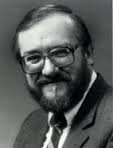 20 years ago tomorrow I was on my way out the door to go apple picking with my family on a New England fall day. As I was walking out the door, the phone rang. My friend and former seminary professor, Al Groves, was calling to tell me that Ray Dillard, professor of Old Testament, had died suddenly the day before of a heart attack while deer hunting. He had had a history of heart problems and he succumbed that day at the age of 49.
20 years ago tomorrow I was on my way out the door to go apple picking with my family on a New England fall day. As I was walking out the door, the phone rang. My friend and former seminary professor, Al Groves, was calling to tell me that Ray Dillard, professor of Old Testament, had died suddenly the day before of a heart attack while deer hunting. He had had a history of heart problems and he succumbed that day at the age of 49.
One year later I was teaching at Westminster Theological Seminary, expected, on some small scale, to join the others in continuing his legacy. I succeeded Ray, but only in the most technical of senses.
Ray taught a generation of students at Westminster Theological Seminary the Old Testament, and I think often of what he taught me. Ray set me and so many others on an path marked by devotion to God and academic exploration.
Ray taught us that it takes work to bring the Old Testament and the Christian story together. He would challenge us by reminding us that 3/4 of the Christin Bible is the Old Testament, so we’d better learn what to do with it. For Ray, the key to that conversation was to accept the conviction of the New Testament writers that Christ was the “climax” Israel’s story (10 years before any of us had heard of N. T. Wright).
Ray taught his students to read the Old Testament like a Christian book–not cheaply by forcing Jesus into every nook and cranny, but by allowing the Old Testament narrative to have its way and then see how Christ reflects and enhances that narrative, what we called a “Biblical Theological” reading of Scripture.
Ray gently modeled for his students how to think theologically about the more messy details of the Old Testament and (here’s the tricky part) to allow those details to inform our theological formulations rather than sequester those details in favor of a passive acceptance of doctrine.
Ray modeled intellectual integrity.
Ray modeled for us how to preach Christ from the Old Testament–again, not by forcing the point but by allowing the Old Testament narrative its due yet without giving the Old Testament the “final word.” Ray taught us to ask ourselves, “Could this sermon have been preached in a synagogue?” If the answer was yes, Ray would challenge us to see how the gospel should affect our reading of Israel’s legacy.
Ray brought his students face to face with 1 and 2 Chronicles–that boring part of the Old Testament that students
 love to skip, because it supposedly just “repeats” what we already read in 1 and 2 Samuel and 1 and 2 Kings. Ray taught us to respect the different theology, the different take on Israel’s history, that we find in those books.
love to skip, because it supposedly just “repeats” what we already read in 1 and 2 Samuel and 1 and 2 Kings. Ray taught us to respect the different theology, the different take on Israel’s history, that we find in those books.
Perhaps not the most daring thing in the world to say by most people’s standards, but Ray modeled this view for us in the context of a very conservative seminary known for it’s uncompromising defense of inerrancy. And Ray struggled to find ways to allow him to work through that tension.
Again, Ray modeled intellectual integrity.
What I remember most of Ray, though, are some personal moments, which even now I remind myself is the true legacy of a teacher–the lives they touch, not what they produce on paper.
A semester did not go by without Ray telling us about his family–more specifically, reminding us not to neglect our families for either the study or the pulpit. I can still see Ray shedding tears in class as he told us stories of his own life, where his obsession to learn hurt his family and left him with great regrets.
Ray modeled vulnerability, and I have never forgotten his admonition to his young students.
I also remember the cognitive dissonance Ray openly (but tactfully) expressed to his students as he negotiated the path between the academic rigor of Old Testament studies and the Westminster legacy of defending biblical inerrancy. In class, Ray would crack open windows and doors in our minds and help us see new possibilities, and often ended the class on a dramatic, tantalizing, note.
After class, Ray was always open to informal conversations with a lingering few wanting to press him further on the theological implications of what he just covered. Ray would keep the challenge before us while also exploring with us possibile, constructive, avenues of integrating faith and intellect.
Ray modeled a spiritual journey.
Ray Dillard would be nearly 70 now, and I wonder now and then what his legacy could have been. But, as for me, his legacy is like a prominent hill, far off in the distance marking that point where my own journey began. I look back on that mountain–to remember. And to thank God.
